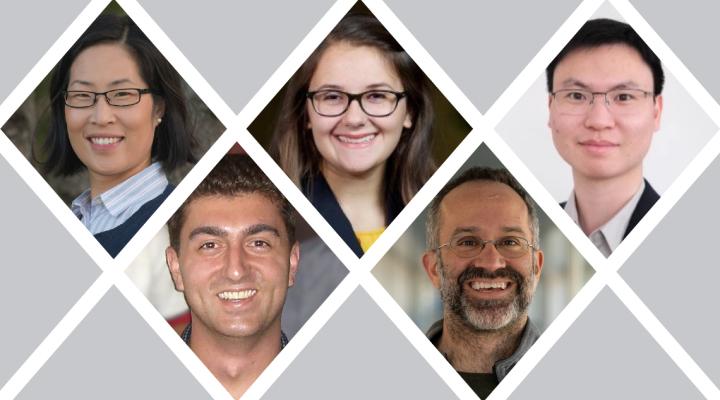Julia Dshemuchadse has joined the faculty of the Department of Materials Science and Engineering (MSE) at Cornell. Dshemuchadse earned her undergraduate degree in physics at the Technische Universitat Dresden (TU Dresden) and her Ph.D. in materials science from ETH Zurich (The Swiss Federal Institute of Technology). In 2015 she began a four-year postdoctoral research position at the University of Michigan. And in May 2019 Dshemuchadse started as an assistant professor at Cornell.
Dshemuchadse studies the structures of complex crystalline materials and their formation. She wants to understand the rules that govern their assembly and stability and to ultimately be able to predict and design new materials.
“Some of these intermetallic compounds we look at have incredibly complex structures,” says Dshemuchadse. “It takes a lot of data mining and analysis just to figure out how they are structured. Something I am interested in at the most basic level is answering the question: how do these particles know where to go and how to assemble?”
Dshemuchadse’s work involves quite a lot of physics. And when she was growing up in Dresden, Germany she would have heard lots of talk of physics at home, as both of her parents had Ph.D.s in physics. “My parents didn’t want me to become a physicist,” says Dshemuchadse. “But I always found their conversations so interesting.” In eleventh grade Dshemuchadse chose math and physics as two focus areas for her classes and by the time she started college she knew she would major in physics.
And by the second year of her undergraduate studies she knew she was going to be an academic. “I knew I was in the right place and doing the right thing when I gave a presentation that year,” says Dshemuchadse. “I investigated a problem that no one had yet answered and in the process I found I was really excited about structures and materials.”
When it came time to choose a graduate program, Dshemuchadse knew she was interested in complex structures. She also knew she wanted to find an advisor whose work she respected. This is how she ended up at ETH Zurich, working with Professor Walter Steurer in his Laboratory of Crystallography. At ETH Dshemuchadse investigated building principles of complex intermetallic compounds using X-ray diffraction patterns.
During her postdoc at Michigan Dshemuchadse worked with Sharon Glotzer. There she focused on molecular dynamics and statistical simulations in order to study soft-matter self-assembly.
At Cornell Dshemuchadse’s work combines her background in crystallography with the modeling and discovery of materials using numerical simulations. Her group studies the self-assembly and stability of complex crystal structures. “I really want to understand the fundamental principles,” says Dshemuchadse, “so that we can someday predict what might form. Structure prediction is probably still pretty far and applications are several steps away, but that is part of what makes my work so daunting and exciting and challenging. There is so much knowledge to uncover on the way to those predictions and applications. There is no real endpoint for this work and that is the exciting part.”
Dshemuchadse is excited to be able to pursue her research at Cornell. “I had such a strongly positive gut reaction to the department here and the University,” says Dshemuchadse. “The campus is beautiful, the graduate field structure is a real positive, and the people here are ambitious to learn without being contentiously competitive, which is how I think of myself, too.”
In the fall semester 2019 Dshemuchadse will teach MSE 5730 Probability, Statistics, and Data Analysis for the Physical Sciences.




